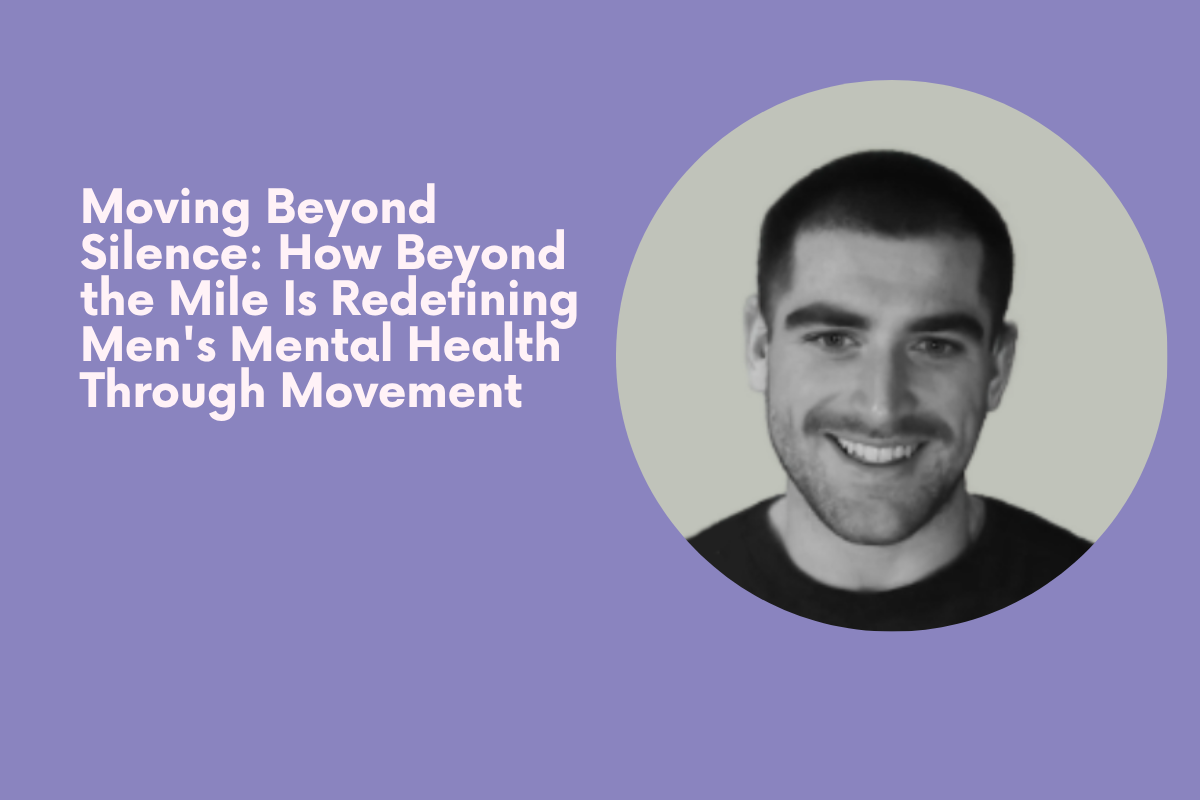The statistics are stark: every year, 500,000 men take their own lives— a silent crisis fuelled by disconnection, loss of purpose, and the barriers men face in finding their place in a changing world. In response to this crisis, Zacc Tullett has created Beyond the Mile, a movement to honour men's lives lost to suicide that harnesses the power of physical activity to create spaces for connection and healing.
Beyond the Mile represents a radical shift in how we approach men's mental health. Rather than asking men to conform to traditional therapeutic models that may feel unnatural or intimidating, this innovative initiative meets them where they are—in movement, in shared effort, and in the side-by-side moments that can spark genuine connection.
At its heart is the ambitious 500/500 campaign: aiming to log 500,000 miles globally—one for every life lost to suicide each year. With 16,141 miles already donated by participants worldwide, the movement is gaining momentum as men and their supporters lace up their running shoes, mount their bikes, and hit the pavement for a cause that transforms individual fitness into collective remembrance and hope.
In this conversation, Zacc shares his insights on why traditional approaches to men's mental health often fall short, how movement creates unique opportunities for connection, and what it means to rewrite the script of masculinity for a generation caught between old expectations and new realities.
Q: Men face unique barriers when it comes to seeking mental health support, often struggling with traditional talk-therapy approaches or clinical settings. How do you see physical activity and shared movement creating alternative pathways for men to open up about their mental health? What is it about the 'side-by-side' experience that makes vulnerability more accessible for men who might otherwise remain silent?
Many men struggle to engage with traditional therapy - partly because it asks them to sit, speak, and share in ways that don’t always come naturally. Movement offers a different route in. When you’re running, training, or walking side-by-side with someone, the pressure to “open up” disappears. There’s no spotlight. Conversation becomes optional, but possible. Vulnerability is invited - not demanded.Physical activity also builds trust through effort. You suffer together, strive together, and in doing so, often find a shared language that doesn’t rely on words. It’s in that space - of movement and challenge - that a different kind of openness begins to emerge. Beyond the Mile taps into this. It doesn’t push men to talk before they’re ready - it simply creates the conditions where connection is more likely. And sometimes, that’s enough to start shifting the story.
Q: Beyond the Mile transforms personal fitness activities into a global movement with the goal of logging 500,000 miles—one for every man lost to suicide annually. How does connecting individual actions to a larger collective purpose help combat the sense of disconnection and loss of meaning that contributes to men's mental health crises? What role does having a tangible, shared mission play in building resilience and hope?
When men feel isolated, overwhelmed, or meaningless, telling them to “just reach out” rarely works. They need purpose. A reason to act. Beyond the Mile offers that - through movement, through community, and through the simple, powerful act of logging a mile for someone lost.At the heart of it is the 500/500 campaign: 500,000 miles for the 500,000 men lost to suicide each year. It’s a powerful target - one mile for every life. And it turns fitness into remembrance, and exercise into something more than self-improvement. When those individual acts come together - thousands of people logging miles across the world - it becomes a statement: we’re still here, and we still care.That sense of collective effort helps fight the disconnection that drives so many men into despair. It reminds them that they’re part of something bigger - that they belong, that their actions matter. The mission doesn’t replace professional support - it complements it. It’s a framework that helps men stay connected while they figure things out.
Alongside the campaign, Beyond the Mile is also building out tools and resources that support deeper conversations - like the Adolescence handbook, a practical guide for parents and mentors to talk with young people about identity, masculinity, and mental health. These are designed to equip people with the correct tools to navigate the evolving landscape of masculinity.
.png)
Q: Your approach acknowledges that we can't simply 'turn back the clock' but must create new paths forward for men in our changing world. How do you see movements like Beyond the Mile helping to redefine what healthy masculinity looks like in relation to mental health? What would success look like in terms of cultural shift—how will we know when we've made meaningful progress in breaking the silence around men's mental health?
The world men were raised to survive in doesn’t exist anymore - but the expectations haven’t shifted fast enough. We’re left with millions of men trying to live up to a script that no longer fits. Beyond the Mile isn’t about tearing up that script - it’s about rewriting it with more space. More options. More truth.Movements like this offer a model of masculinity that allows men to be both strong and struggling. Both driven and disconnected. Both leaders and learners. It’s not about weakness - it’s about wholeness. Mental health becomes less of a side-topic and more of a shared reality.Success looks like culture changing from the inside out. When checking in on a mate becomes normal. When men feel proud - not ashamed - to prioritise their wellbeing. When ‘opening up’ doesn’t feel like a performance, but just part of being human.We’ll know we’re making progress when men no longer feel ashamed to say they’re struggling. When connection becomes part of the norm, not the exception. When the phrase “I’ve got you” carries as much weight as “man up.”
Start logging your own miles and honouring lives by joining our Strava group: https://strava.app.link/6seZubCGoVb
Check out our resources here: https://beyondthemile.org/resources





.png)